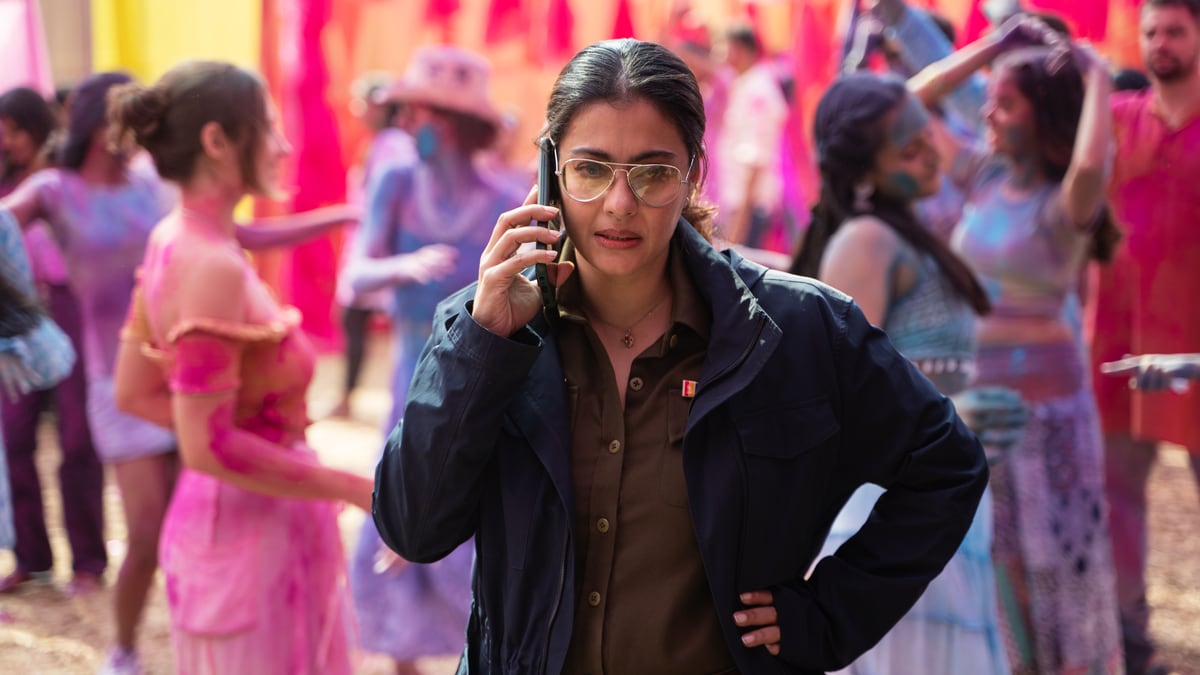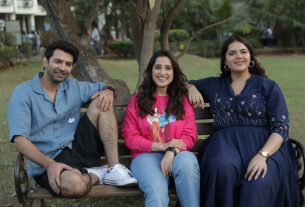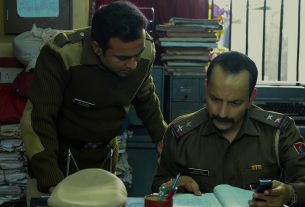
We have all at some point encountered the kind of duplicitous men who would shamelessly beat their wives, catcall every possible female, exert their dominance, and yet call themselves feminists who “respect women.” They won’t even deny their preposterous acts and would either blame the victim for triggering them or make fun of their hopelessness. These men, whose actions are often overcompensating for their own inadequacies and dysfunctions, can unfortunately be found in every stratum of society.
Netflix’s latest original film Do Patti, brings to us one such man in Dhruv Sood (Shaheer Sheikh) from a small hill town, who regularly beats his traumatised wife Saumya (Kriti Sanon). The film begins with a paraglide gone wrong, as the couple hang in the air for their lives from their glider. Saumya, who thinks her husband has sabotaged her harness, begs for her life. Upon being rescued, Saumya tells inspector Vidya Jyothi (Kajol) that her husband tried to murder her, and we are taken to a flashback sequence of three months ago, when the two first met.
Saumya is introduced as an anxious introvert, who has been in severe depression since her parents died. Now living with an alcoholic caretaker, she is quietly suffering from several phobias and traumas. She also has a tumultuous relationship with her twin sister Shailee, who was sent off to a hostel because of her abusive behaviour towards Saumya, only to return in time to interfere with her love life.
A major flaw that holds Do Patti back is the incoherent plot and its fluctuating tone. Some of the scenes are intense and leave a lasting impact; others are merely fillers that don’t add anything meaningful to the story. A thriller is supposed to constantly keep viewers on their toes and carefully set up the pieces before pulling the rug. Do Patti, however, isn’t able to maintain that iron grip on its plot.
The film, for instance, wastes a lot of time in establishing Kajol’s character. She plays an idealist cop who talks in Bollywood’s stereotypical idea of what a hinterland accent is supposed to be — it’s neither Hindi nor Haryanvi or Bhojpuri. Can we please stop with the lazy sub-altern caricature already?
At one point, it begins to feel that the writers were so starstruck by Kajol that they forgot to add any meat to her role and hoped she’d carry the character with her natural charisma. Kajol’s Vidya Jyothi, who goes by “VJ”, is goofy, close to her popular roles in romantic comedies, instead being a serious cop. While Kajol has tried her best to deliver with whatever little she was given, the blame lies with the writers for underutilising a refined actor like her. If you aren’t her fan, her story arc will feel stretched thing on several occasions.
Another area where the film falters is its stereotypical and regressive representation of its female characters. Sanon’s twin sister is shown as a loose woman, who drinks, has short hair, wears seductive outfits, goes clubbing and flirts with men. Why are we still sticking to these idiotic tropes in 2024 and feeding the patriarchal beast. Shailee is painted with a singular brush, and there are no other shades to her character. She is supposed to be villainous and scheming, so of course she’s not in line with what our “culture” deems righteous. Or is it so that she’s automatically labelled evil just because she drinks or likes to dress up? While Saumya’s extremely introverted behaviour can be attributed to her trauma, the film could have — and in fact, should have — avoided Shailee’s version from the witchcraft era.
Despite its flaws, the film does a fine job in its representation of patriarchy, violence against women, childhood trauma and its deep-seated impact. In a disturbing scene from the film, we see Dhruv brutally beating Saumya. He pulls her hair, kicks her in the guts mercilessly, rolls her like a football, throws her over the stairs and leaves her blood-soaked on the floor. In the end, he candidly throws away the typical “why did you trigger my anger” statement.
The entire sequence is well-performed and boils your blood to the extent where you’d feel like entering the screen and punching Sheikh’s character. While it’s disturbing and can be triggering for victims of abuse, it is also one of the most powerful scenes in the film. It not only shows the brutality of domestic violence against women but also the sick and twisted psyches of monsters who perpetrate abuse.
The film also boasts some amazing performances, especially by Sanon and Sheikh. Sanon has done a brilliant job at playing dual roles and is equally convincing in both of them. Her characters have been carefully written, infused with the smallest aspects of the human behaviour in consideration. There is a scene where Saumya is pushed into paragliding for the first time, despite having severe acrophobia, and midway through the activity, she gets teary-eyed thinking of her dead mother. It is such a moving representation of how the grief one might be carrying can subconsciously erupt with even the slightest push, reminding us that it was waiting beneath the surface all this while. While the National award-winning actor has given a few impressive performances earlier as well, especially in Mimi, she has outdone herself in this Netflix original.
The way Do Patti handles and portrays the themes of childhood trauma, sibling rivalries, domestic violence, abuse, and the objectification of women is quite impressive. It intimately explores even the smallest details of these difficult themes, complemented by brilliant performances. However, brilliance comes in patches. If only the film had better pacing or constant momentum throughout its runtime — and avoided harmful stereotypes — it would have done justice to the important issues it attempts to explore. Films dealing with such sensitive themes need to be more captivating to appeal to a larger audience. Do Patti handles its subject matter in impressive ways — it has its intentions in the right place. But it struggles to establish itself as a good thriller.
Rating: 6.5/10



